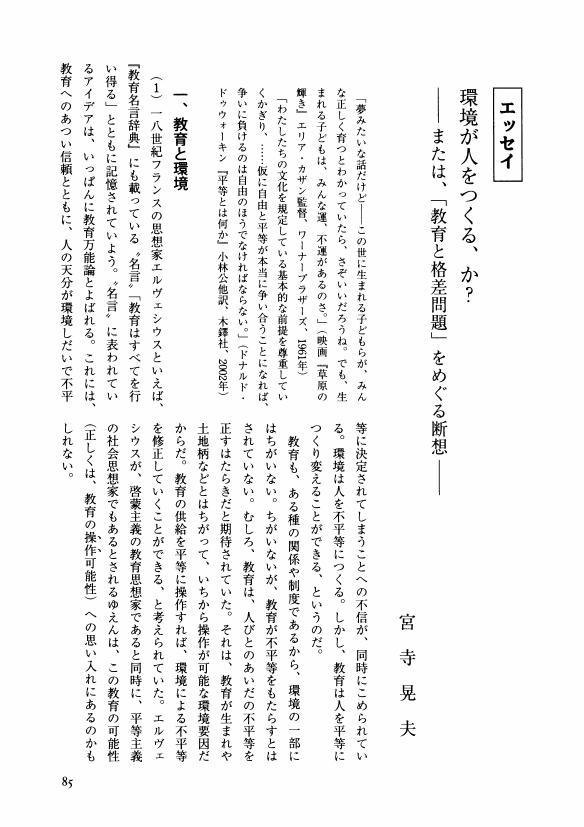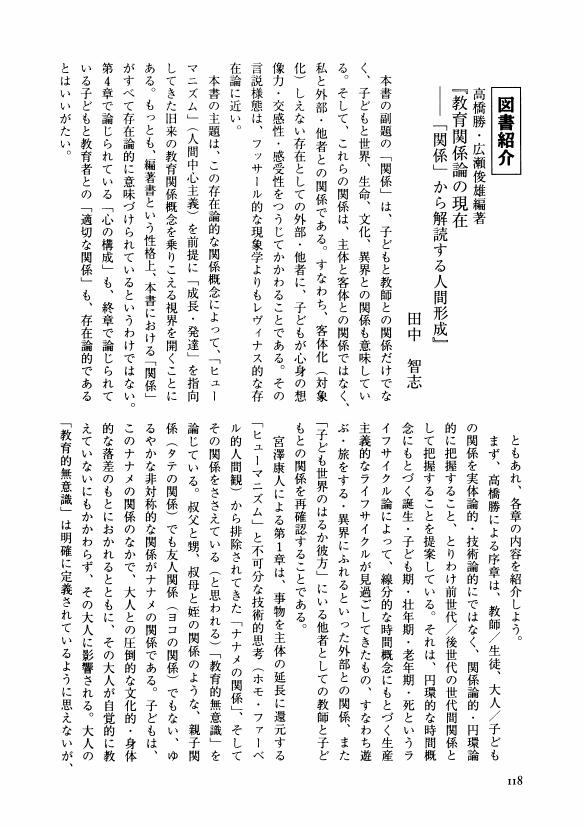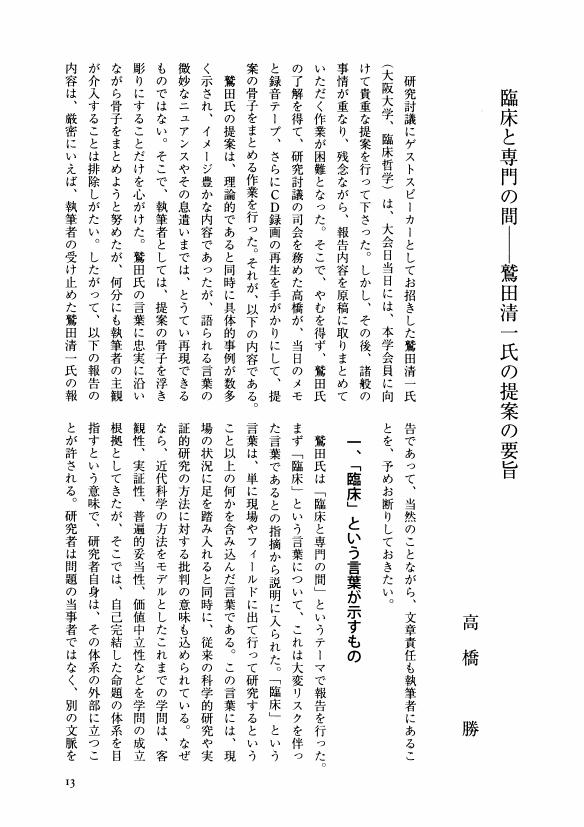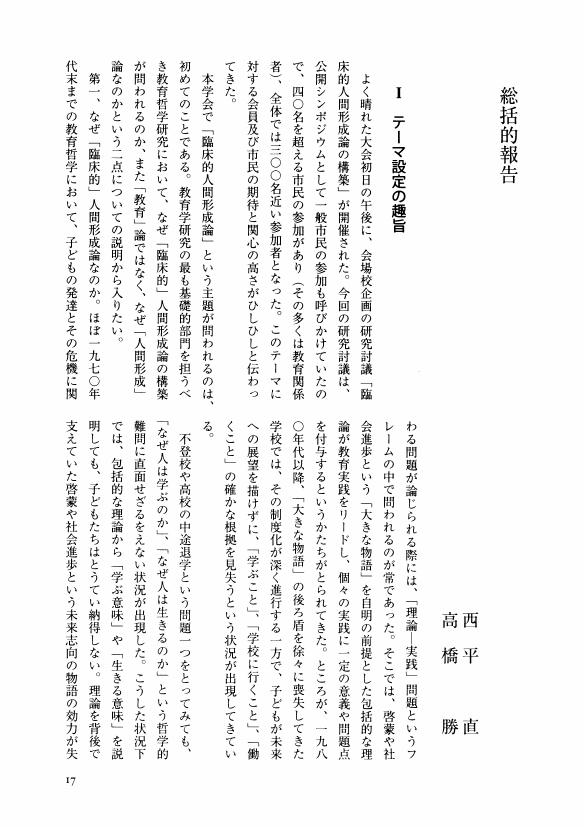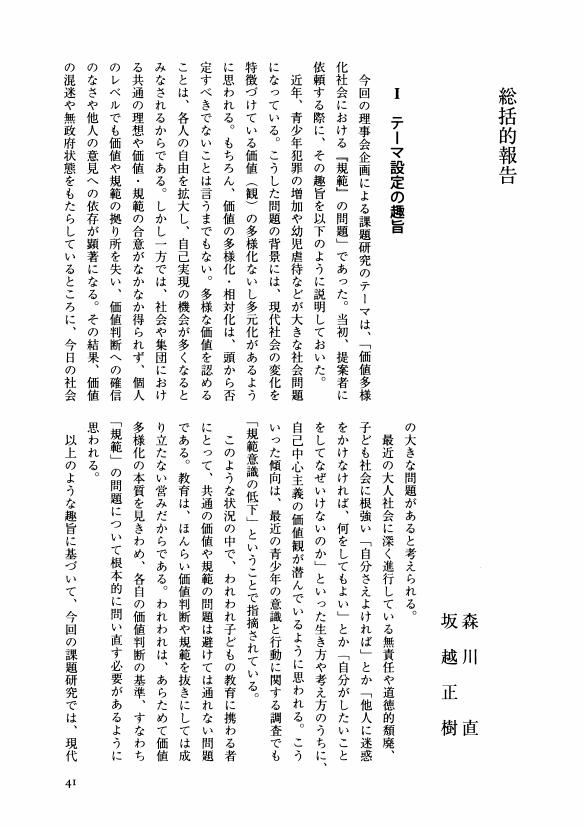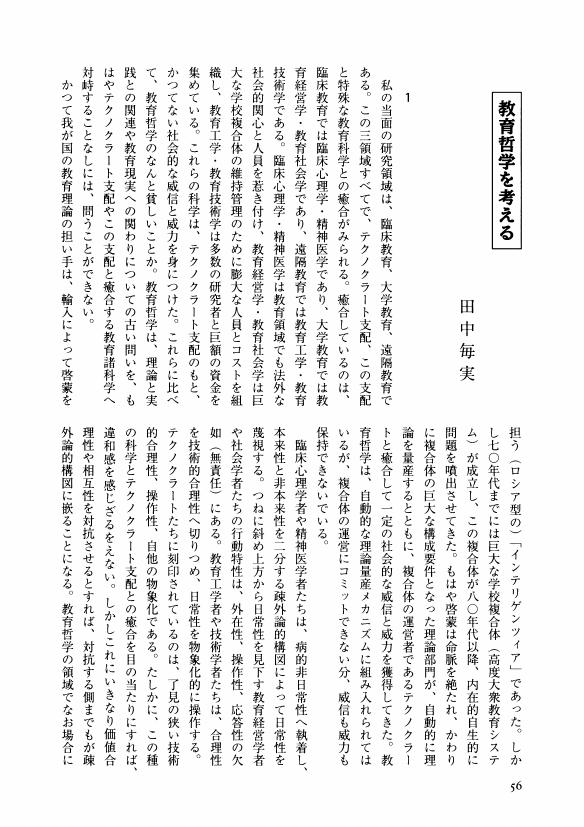1 0 0 0 OA 戦争と教育 フーコーからプラトンへ
- 著者
- 加藤 守通
- 出版者
- 教育哲学会
- 雑誌
- 教育哲学研究 (ISSN:03873153)
- 巻号頁・発行日
- vol.2005, no.92, pp.1-21, 2005-11-10 (Released:2009-09-04)
- 参考文献数
- 17
The aim of this article is to show the hidden relationship between war and education in the history of Western thought.In the first chapter we examine and evaluate a thesis developed by Michel Foucault in his lecture at Collège de France, Il faut défendre la société, originally held in 1976 but first published in 1997. According to this thesis, the idea of the struggle between opposing 'nations' or 'societies' within a country, such as between the Normans and the Saxons in England or between the Francs and the Gauls in France played an important role in the formation of modern political and historical thought including Nazism and Stalinism. This thesis can have strong impact to our understanding of modern education.In the second chapter we examine the classical theory of education represented by Plato's paideia and show the crucial role played by war in this theory. For it is only by comparing the soul with a state (polis) divided by the strife between different classes, that Plato was capable of developing his theory of the inner self. The result is of special interest, because Foucault himself viewed Plato as the arch-enemy of the 'historicism' which stand on the side of the above-mentioned modern theory of war.Thus, it is not only in the modern educational thought but also in the classical theory of paideia that war played an important role.
1 0 0 0 OA 戦争と教育-教育の責任をめぐって-
- 著者
- 増渕 幸男
- 出版者
- 教育哲学会
- 雑誌
- 教育哲学研究 (ISSN:03873153)
- 巻号頁・発行日
- vol.2005, no.92, pp.22-39, 2005-11-10 (Released:2009-09-04)
- 参考文献数
- 20
The twentieth century was a century of war. Despite the passionate longing for peace, and the vigorous efforts of many throughout the world community to attain it, war continues to be a part of the human condition. As political efforts to bring an end to war have had few results, humankind has placed its hopes for a world without war on education, hoping that through education the world can raise generations of peaceloving young people who will oppose war. After the Second World War, the charter of UNESCO clearly set out a road to peace and charged educators with a major role in achieving that goal. In spite of all of our good intentions, however, war continues to plague our contemporary world.As members of the human race we cannot ignore what seems to be an element of human nature that leads to continuous movements that repeat the cycle of “want-seek-struggle-disorder”. Should we then recognize the potential for evil as a part of human nature? Yes, I believe that evil itself is a part of the essential nature of human beings. That being the case, I would argue that : 1. Education was also implicated in the crime of war, 2. Education plays a role in fomenting war.Education not only imparts knowledge of the good; it also has taught methods of war. We can see this in the fact that as societies become “more civilized”, they also raise the making of war to new levels. We also must acknowledge the fact that religion is also involved in conflicts between nations, and that many wars take place against the background of religious disagreements. As both religion and education are concerned with the formation of the spirit, the relationship between war and religion is a complex one that education has difficulty resolving.War is a crime against humanity, and moreover necessarily causes spiritual loss. Education is also caught in a contradiction : opposing violence, and at the same time participating in war. If we cannot resolve the paradox between the two, then how can we call for accountability from education? This paper will consider these complex questions and offer some useful suggestions.
1 0 0 0 OA 《大人》になること/《大人》であることの可能性 超越論的な〈大人〉の失効を越えて
- 著者
- 田中 裕喜
- 出版者
- 教育哲学会
- 雑誌
- 教育哲学研究 (ISSN:03873153)
- 巻号頁・発行日
- vol.2005, no.92, pp.59-76, 2005-11-10 (Released:2010-05-07)
- 参考文献数
- 31
It has been self-evidently assumed that children would grow to adulthood through the participation in the adult community. But we can't do so any longer, because the young today have been unsable to feel actually themselves adults beyond twenty years of age. The main purpose of this paper is to clarify what our becoming/being “Adult” means in a social and ethical sense at the present day.To begin with, we will analyze the mechanism that children heretofore became adult by constructing the transcendental 'Adult' through the interaction of experiential world and conforming themselves to the transcendental 'Adult' as 'the privileged other restored norms.'Secondly, we will grasp the modern conditions under which we have sought for universal and inclusive norms exhaustively, with the result that the transcendental 'Adult' has emptied, this mechanism has lapsed, and we have faced the difficulty in growing to adulthood.Finally, we will find out the new way we extricate ourselves from the present blockade and attain becoming/being 'Adult' in the different way from constructing the transcendental 'Adult' as ever. Then, we will suggest that we give up persisting the identity of the self, accept the contingency and changeability of the self actively, and open up the possibilities of communication between ourselves and the other with whom we don't share norms.
1 0 0 0 OA 教育学の「個人化」はいかにしてはじまったのか
- 著者
- 森田 尚人
- 出版者
- 教育哲学会
- 雑誌
- 教育哲学研究 (ISSN:03873153)
- 巻号頁・発行日
- vol.2005, no.92, pp.96-114, 2005-11-10 (Released:2009-09-04)
1 0 0 0 OA 教育哲学を考える
- 著者
- 田中 智志
- 出版者
- 教育哲学会
- 雑誌
- 教育哲学研究 (ISSN:03873153)
- 巻号頁・発行日
- vol.2005, no.92, pp.115-116, 2005-11-10 (Released:2009-09-04)
1 0 0 0 OA 環境が人をつくる, か? または, 「教育と格差問題」をめぐる断想
- 著者
- 宮寺 晃夫
- 出版者
- 教育哲学会
- 雑誌
- 教育哲学研究 (ISSN:03873153)
- 巻号頁・発行日
- vol.2005, no.91, pp.85-101, 2005-05-10 (Released:2010-01-22)
- 参考文献数
- 9
1 0 0 0 OA 夢と現のあわいで
- 著者
- 鈴木 晶子
- 出版者
- 教育哲学会
- 雑誌
- 教育哲学研究 (ISSN:03873153)
- 巻号頁・発行日
- vol.2005, no.91, pp.102-103, 2005-05-10 (Released:2009-09-04)
1 0 0 0 OA 稲葉宏雄著『近代日本の教育学 谷本富と小西重直の教育思想』
- 著者
- 木内 陽一
- 出版者
- 教育哲学会
- 雑誌
- 教育哲学研究 (ISSN:03873153)
- 巻号頁・発行日
- vol.2005, no.91, pp.104-110, 2005-05-10 (Released:2009-09-04)
1 0 0 0 OA 松下良平著『道徳の伝達-モダンとポストモダンを超えて』
- 著者
- 林 泰成
- 出版者
- 教育哲学会
- 雑誌
- 教育哲学研究 (ISSN:03873153)
- 巻号頁・発行日
- vol.2005, no.91, pp.111-117, 2005-05-10 (Released:2009-09-04)
1 0 0 0 OA 高橋勝・広瀬俊雄編著『教育関係論の現在-「関係」から解読する人間形成』
- 著者
- 田中 智志
- 出版者
- 教育哲学会
- 雑誌
- 教育哲学研究 (ISSN:03873153)
- 巻号頁・発行日
- vol.2005, no.91, pp.118-120, 2005-05-10 (Released:2009-09-04)
1 0 0 0 OA 徳永正直著『教育的タクト論-実践的教育学の鍵概念』
- 著者
- 福田 弘
- 出版者
- 教育哲学会
- 雑誌
- 教育哲学研究 (ISSN:03873153)
- 巻号頁・発行日
- vol.2005, no.91, pp.121-122, 2005-05-10 (Released:2009-09-04)
1 0 0 0 OA 子どもはどのようにして世界を理解するのか 臨床的アプローチに向けて
- 著者
- 鳥光 美緒子
- 出版者
- 教育哲学会
- 雑誌
- 教育哲学研究 (ISSN:03873153)
- 巻号頁・発行日
- vol.2005, no.91, pp.7-12, 2005-05-10 (Released:2009-09-04)
- 参考文献数
- 14
1 0 0 0 OA 臨床と専門の間-鷲田清一氏の提案の要旨
- 著者
- 高橋 勝
- 出版者
- 教育哲学会
- 雑誌
- 教育哲学研究 (ISSN:03873153)
- 巻号頁・発行日
- vol.2005, no.91, pp.13-16, 2005-05-10 (Released:2009-09-04)
1 0 0 0 OA 総括的報告
- 著者
- 西平 直 高橋 勝
- 出版者
- 教育哲学会
- 雑誌
- 教育哲学研究 (ISSN:03873153)
- 巻号頁・発行日
- vol.2005, no.91, pp.17-22, 2005-05-10 (Released:2009-09-04)
1 0 0 0 OA 規範伝達のルーティンから規範創設の瞬間へ
- 著者
- 土戸 敏彦
- 出版者
- 教育哲学会
- 雑誌
- 教育哲学研究 (ISSN:03873153)
- 巻号頁・発行日
- vol.2005, no.91, pp.29-34, 2005-05-10 (Released:2009-09-04)
- 参考文献数
- 3
1 0 0 0 OA 道徳からの逃走、氾濫する〈規範〉
- 著者
- 松下 良平
- 出版者
- 教育哲学会
- 雑誌
- 教育哲学研究 (ISSN:03873153)
- 巻号頁・発行日
- vol.2005, no.91, pp.35-40, 2005-05-10 (Released:2010-05-07)
- 参考文献数
- 2
1 0 0 0 OA 総括的報告
- 著者
- 森川 直 坂越 正樹
- 出版者
- 教育哲学会
- 雑誌
- 教育哲学研究 (ISSN:03873153)
- 巻号頁・発行日
- vol.2005, no.91, pp.41-46, 2005-05-10 (Released:2009-09-04)
1 0 0 0 OA 教育との連関における気分の哲学的「発見」 M・ハイデガー『存在と時間』以前のパトス解釈
- 著者
- 井谷 信彦
- 出版者
- 教育哲学会
- 雑誌
- 教育哲学研究 (ISSN:03873153)
- 巻号頁・発行日
- vol.2005, no.91, pp.47-65, 2005-05-10 (Released:2009-09-04)
- 参考文献数
- 22
This paper investigates the origin of Heidegger's theory of Pathos prior to his Sein und Zeit. Pathos is a concept generally means moods or sufferings. It has long been considered that moods and sufferings are closely related to education and human development. How is it possible, however, to think about moods and sufferings in connection with education? Heidegger's theory of Pathos gives some valuable suggestions concerning this question.In his earlier thinking, Heidegger already appreciated a close relationship between moods and sufferings, on one hand, as well as our existence, on the other. In his lecture, “Grundbegriffe der aristotelischen Philosophie” (1924), he scrutinized the Greek concept of Pathos. He attempted to reveal those fundamental grounds upon which our understanding of, and speaking about, Pathos become possible. According to Heidegger, the concept has three basic meanings; 1) variable disposition, 2) suffering, 3) passion. In our Dasein, we human beings always have the possibilities of being angry, grieved, or pleased. In these variable moods, we as In-der-Welt-Sein are constantly and inevitably caught by the world and ourselves. Being thus encountered by the world or by ourselves, we are in such movedness (Bewegtheit) as being embarrassed or making up our minds. In this way, we always find the world and ourselves in moods through Logos.In conclusion, the study of the concept of Pathos brings us to those fundamental experiences which enable us to understand and speak about moods and sufferings in connection with education : 1) movedness, 2) passivity, 3) discoveredness (Entdecktheit). The present paper is an initial attempt to find a proper way to think and speak about moods and sufferings.
- 著者
- 柴山 英樹
- 出版者
- 教育哲学会
- 雑誌
- 教育哲学研究 (ISSN:03873153)
- 巻号頁・発行日
- vol.2005, no.91, pp.66-84, 2005-05-10 (Released:2010-05-07)
- 参考文献数
- 44
This paper describes an aspect of Steiner's discourse concerning “Body, ” “Rhythm, ” and “Education.” At first, the author will analyze Steiner's lectures in 1923 on “Muse Education” in ancient Greece, because this concept and his educational practice sustain an important relationship. Steiner envisages the viewpoints of “Rhythmic System” and “Synesthesea” from the antcient Greek idea of the universe. These viewpoints enable him to adopt “Art Education” in his educational practice.Here, the author will compare Steiner's discourse with the thought of Dalcroze, a contemporary philosopher. Dalcroze and Steiner give their thought to the relation of the human body and rhythm, an Aporia for 19th century science. By appropriating the evolutionary theory in the different contexts, both try to explicate the mechanism of the relation between body and rhythm. Each identifies a distinct “Organ of Sense, ” and tries to develop it respectively. But their difference ultimately drives from linguistic definitions. Steiner's “Euryhtmie” consists in the rhythm and gesture which consist in the rhythm and gesture as defined by language.Moreover, the beginning of the 20th century has discovered various “rhythms.” Krieck takes up the rhythm that promoted the moment of festivity as well as human mobilization to community. Dalcorze mentions the rhythm which facilitated human adjustment to the external environment. Steiner points to the inner rhythm of life and to that of words as logos. Although the author has analyzed the same word “Rhythm”, he found its various meanings.The discourse on the connection of “Body, ” “Rhythm, ” and “Education” indicates different possibilities and dangers which may attend various rhythms. Dalcroze notes the power of rhythm which promotes individuals' involvement in the community. By comparison, Steiner emphasizes the transcendental relations between the universe and individuals, and he explores a vision of the rhythm and education distinctly different from that for the formation of community.
1 0 0 0 OA 教育哲学を考える
- 著者
- 田中 毎実
- 出版者
- 教育哲学会
- 雑誌
- 教育哲学研究 (ISSN:03873153)
- 巻号頁・発行日
- vol.2004, no.90, pp.56-57, 2004-11-10 (Released:2009-09-04)


